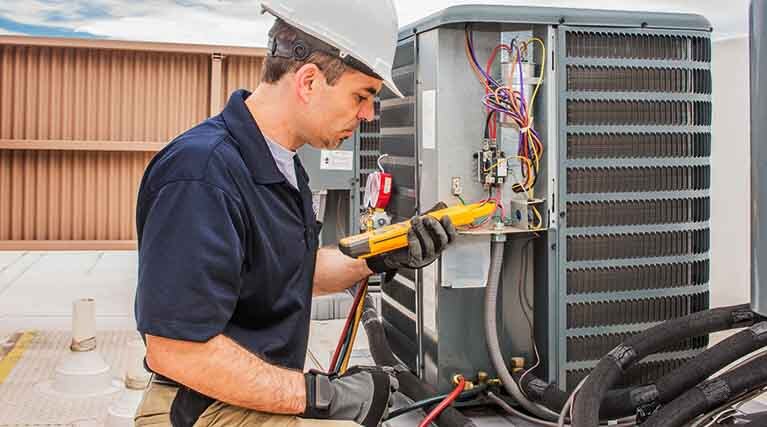What Do HVAC/R Techs Do? An In-depth Look at the Job
Few elements are as crucial as HVAC/R systems in modern living and working spaces. These systems ensure our environments remain comfortable, safe, and efficient, regardless of outside weather conditions. Behind the scenes, skilled technicians, known as HVAC/R technicians, play a pivotal role in installing, maintaining, and repairing these intricate systems. Let’s delve into the multifaceted world of HVAC/R technicians and explore the breadth of their responsibilities, skills, and the importance of their work.
Understanding HVAC/R:
HVAC/R stands for Heating, Ventilation, Air Conditioning, and Refrigeration. These systems are integral to residential, commercial, and industrial buildings, providing controlled indoor environments for comfort, health, and productivity.
- Heating: HVAC/R systems ensure proper heating during cold weather, utilizing various methods such as furnaces, boilers, and heat pumps.
- Ventilation: Ventilation systems maintain indoor air quality by exchanging stale air with fresh outdoor air. This process removes pollutants, controls humidity, and prevents the buildup of harmful gases.
- Air Conditioning: HVAC/R systems offer cooling solutions through air conditioning units, ensuring optimal comfort during hot weather.
- Refrigeration: Refrigeration systems are essential for preserving perishable goods in commercial settings such as supermarkets, restaurants, and pharmaceutical facilities.
The Role of HVAC/R Technicians:
HVAC/R technicians are highly skilled professionals responsible for installing, maintaining, and repairing HVAC/R systems. Their duties encompass various tasks, requiring a blend of technical knowledge, problem-solving abilities, and customer service skills.
1. Installation: HVAC/R technicians are involved in the initial setup of heating, cooling, and refrigeration systems in new construction projects or existing buildings undergoing renovations. This process includes interpreting blueprints, selecting appropriate equipment, and ensuring proper installation according to industry standards and regulations.
2. Maintenance: Regular maintenance is crucial for the optimal performance and longevity of HVAC/R systems. HVAC/R technicians conduct routine inspections, cleaning, and tune-ups to identify and address potential issues before they escalate. This preventive maintenance helps improve energy efficiency, prevent breakdowns, and prolong the lifespan of equipment.
3. Repair: When HVAC/R systems malfunction or encounter problems, technicians diagnose the issues and implement effective solutions. This may involve troubleshooting electrical components, replacing faulty parts, repairing leaks, or recalibrating system controls. Timely and accurate repairs are essential to minimize downtime and restore comfort to the occupants.
4. Upgrades and Retrofits: As technology advances and energy efficiency standards evolve, HVAC/R technicians upgrade existing systems to meet current requirements. They may retrofit older equipment with newer components, integrate smart controls for improved efficiency, or recommend energy-saving solutions to reduce operational costs and environmental impact.
Skills and Qualifications:
Becoming a proficient HVAC/R technician requires technical expertise, practical experience, and continuous learning. Essential skills and qualifications include:
- Technical Knowledge: A thorough understanding of HVAC/R principles, equipment operation, and troubleshooting techniques is essential. Technicians must be familiar with electrical systems, refrigeration cycles, airflow dynamics, and environmental regulations.
- Certifications: Many HVAC/R technicians obtain industry-recognized certifications, such as those offered by organizations like the North American Technician Excellence (NATE) or the Refrigeration Service Engineers Society (RSES). These certifications validate competency in specific areas of HVAC/R technology and may enhance career opportunities.
- Problem-Solving Skills: HVAC/R technicians must possess strong analytical and problem-solving abilities to diagnose complex issues and develop practical solutions. Attention to detail and logical reasoning are paramount when troubleshooting diverse systems.
- Customer Service: Interacting with clients and building occupants is crucial to the job. Effective communication, professionalism, and a customer-centric approach are essential for delivering quality service and addressing client concerns.
The Importance of HVAC/R Technicians:
The work of HVAC/R technicians is indispensable in maintaining comfort, health, and productivity in residential, commercial, and industrial settings. Their contributions extend beyond mere temperature control; they play a vital role in:
- Energy Efficiency: Well-maintained HVAC/R systems operate more efficiently, consuming less energy and reducing utility costs. Technicians optimize system performance through regular maintenance and upgrades, contributing to sustainability efforts and environmental conservation.
- Indoor Air Quality: Proper ventilation and filtration are critical for ensuring clean and healthy indoor air. HVAC/R technicians monitor air quality parameters and implement measures to mitigate pollutants, allergens, and contaminants, safeguarding occupants’ well-being.
- Comfort and Productivity: Comfortable indoor environments promote occupant comfort, productivity, and overall satisfaction. HVAC/R technicians strive to maintain optimal temperature, humidity levels, and air circulation, creating conducive spaces for living, working, and leisure activities.
- Equipment Reliability: Timely maintenance and prompt repairs are essential for minimizing downtime and disruptions. HVAC/R technicians’ expertise ensures systems operate reliably, reducing the risk of breakdowns and costly repairs.
Conclusion
In conclusion, HVAC/R technicians ensure indoor environments’ efficient operation, comfort, and safety. Their diverse skill set, technical knowledge, and dedication contribute to the functionality and longevity of HVAC/R systems across residential, commercial, and industrial sectors. As the demand for energy-efficient and environmentally sustainable solutions continues to grow, the expertise of HVAC/R technicians remains indispensable in shaping the future of building technology and environmental stewardship.

















